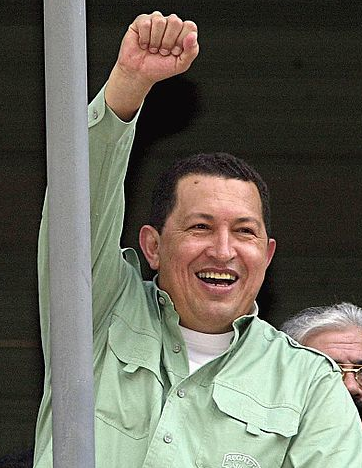In late September, a mysterious audio recording [es] of a phone call allegedly made by President Hugo Chávez to his brother, Adán Chávez, began circulating online. In the recording, Chávez asks his brother how his family is doing and speaks his recuperation from illness. “I am more alive than ever,” he tells him. The phone call, said to be made on September 16, 2013, sent chills down the spines of many an Internet user in Venezuela — Chávez died of cancer in March of 2013. On September 28, the almost certainly phony recording went viral on social networks.
That same day, Twitter users in Venezuela reported that all .co domains were inaccessible over the nation's leading government-owned ISP, Cantv. The .co domain is the country code for neighboring Colombia, but there are no restrictions on its purchase by individuals or companies outside of Colombia.
Minutes after initial blocking reports surfaced, more users reported that the blockage extended not only to .co domains, but to URL shorteners including bit.ly, fb.me and goo.gl. @Condemontcristo tweeted:
Cantv controlando las redes, bloqueados los dominios t.co y otros más para evitar la apertura de links en twitter
— Edmond Dantés™ (@Condemontcristo) September 29, 2013
CANTV [is] controlling networks, blocked the domains t.co and others to avoid opening links on twitter
For several hours, all links from Twitter were dead — given that t.co is Twitter's url shortener, this all urls shared via Twitter were inaccessible. Users speculated that authorities blocked the .co domain because of the spread of the audio recording through social networks, especially Twitter. The thesis was strengthened by the fact that Soundcloud.com (one of the sites where the audio was originally hosted) was also made unavailable:
Cantv veta soundcloud por audio del difunto.. Pero se equivocan de botón y joden el aba.
— Bonner (@CcsBonner) September 29, 2013
CANTV bans Soundcloud because of the late [President]'s audio… But they pressed the wrong button and fucked up the broadband.
Other users thought the blockage was a clumsy attempt to ban DolarToday.co, a website that publishes information on the price of the so-called “black dollar” (the exchange valuation for foreign currency outside the government's rigid exchange control). The website and several of its variants have been blocked for some time now — the .co variant was a mirror set up a few weeks prior to the incident in order to circumvent the ban. On August 25, @DolarToday tweeted, “we are being blocked on Cantv…use dolartoday.co temporarily.”

DolarToday screenshot, taken October 14, 2013.
Blocks on .co domains continued for several days, and Cantv later said it was a “failure” that they were working to fix. SoundCloud and other websites were unblocked later, while DolarToday websites remain blocked, among several other similar websites. This marks yet another episode of irregular behavior from Cantv. Reports of website blocking without any judicial or administrative proceeding span from 2010, and earlier this year, all web traffic was interrupted during election day, allegedly to “avoid a hacking attempt”.





1 comment